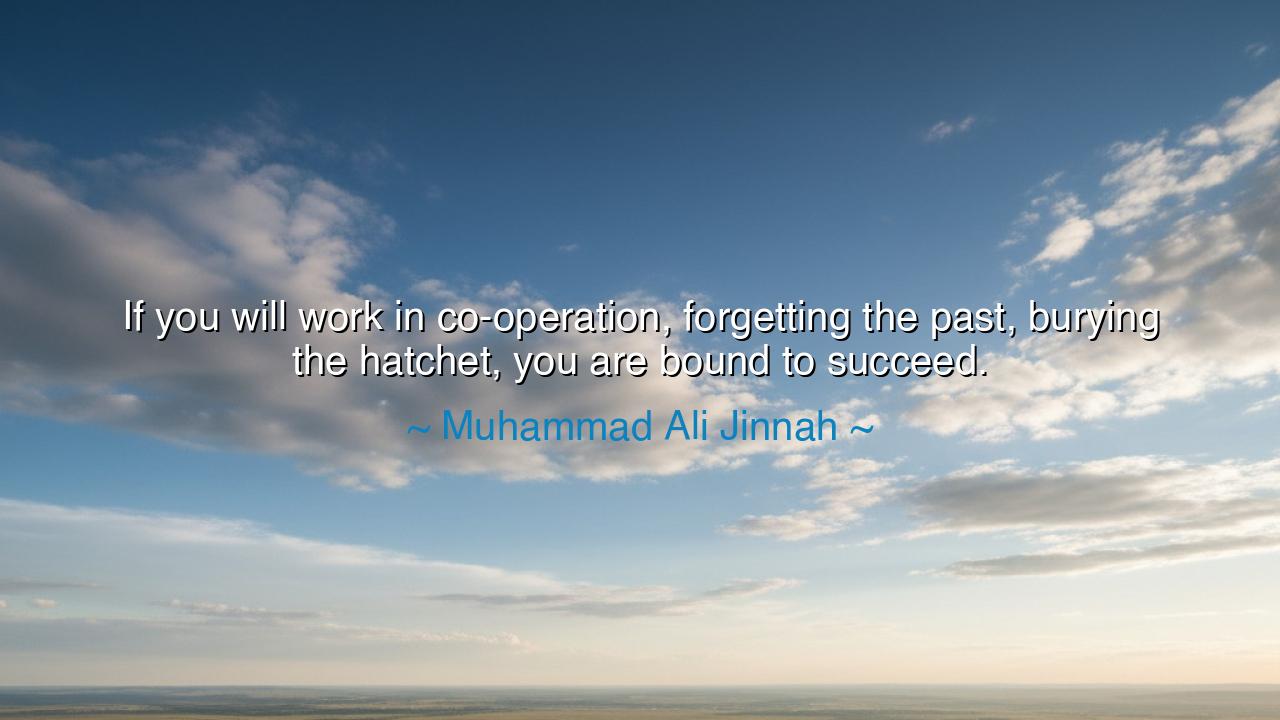
If you will work in co-operation, forgetting the past, burying
If you will work in co-operation, forgetting the past, burying the hatchet, you are bound to succeed.






Hear the noble words of Muhammad Ali Jinnah, founder and guide of a nation, who declared: “If you will work in co-operation, forgetting the past, burying the hatchet, you are bound to succeed.” In this saying lies the timeless wisdom of unity—that the strength of many hearts joined as one surpasses the strength of any single arm. For discord weakens, but co-operation builds empires that endure.
He counsels us to forget the past, not in the sense of casting aside memory, but of releasing the poison of old grievances. For the wounds of yesterday, if clung to, grow into chains that bind progress. To bury the hatchet is to cast away enmity, to break the cycle of vengeance, and to sow the seeds of reconciliation. This is no easy path, yet it is the only road that leads to peace and lasting greatness.
Jinnah, who himself stood at the crossroads of history, understood that a people divided cannot prosper. The call to co-operation was not mere rhetoric, but necessity, for only in unity could a nation rise from turmoil into strength. His words echo the wisdom of the ancients: that the city, the tribe, the kingdom—none can thrive when brother turns against brother.
Thus the promise: you are bound to succeed. Success is not a matter of fortune alone, but the fruit of harmony, labor shared, and enmities laid to rest. When men and women walk together with common purpose, their burdens lighten and their triumphs multiply. In this, Jinnah speaks a truth as old as mankind—that greatness comes not from strife, but from unity of will.
Therefore, O seekers of destiny, remember: cast away the hatreds of old, clasp hands in co-operation, and walk forward together. For the past is a grave, but the future is a garden, and only by sowing in peace shall you reap the harvest of success. Would you like me to frame this into a solemn vow of brotherhood, as if spoken before a gathering of leaders and people?






XNPhan Xuan Nhat
Muhammad Ali Jinnah’s quote is a call for unity and progress, but it also raises the question of whether we can truly cooperate without fully addressing past conflicts. While it’s empowering to think that cooperation and moving forward will lead to success, how do we deal with deep-rooted issues that might affect the cooperation? Can we truly forgive and forget, or does true healing require more than simply letting go of the past?
OCMark Oniki Chiquito
Jinnah’s quote strikes at the core of what many of us struggle with: letting go of past conflicts to achieve success. Cooperation is essential in any team, but how do we build trust after the past has caused harm? Is the act of burying the hatchet a simple solution, or does it require deeper work to heal and rebuild? Can success really be achieved if past issues aren’t fully addressed or resolved?
MH10CT2-10- Le Nguyen Minh Hien
I love how Jinnah emphasizes the role of cooperation in achieving success. The idea of burying the hatchet suggests that personal or historical grievances can hold us back from progress. But I wonder, is it always possible to just 'forget the past' and move forward? Can unresolved issues be truly left behind, or do they sometimes come up again, affecting our ability to cooperate and succeed? How do we find the balance between reconciliation and acknowledgment of past mistakes?
PTHien Pham Thu
Muhammad Ali Jinnah's message is powerful because it stresses the importance of cooperation and letting go of past conflicts. It’s a reminder that holding onto grudges can block progress. But how often do we see organizations, communities, or even nations struggle with this? Can we truly achieve success if we don’t address past wrongs, or is it better to move forward without constantly revisiting history? Does this quote apply to personal relationships as well?